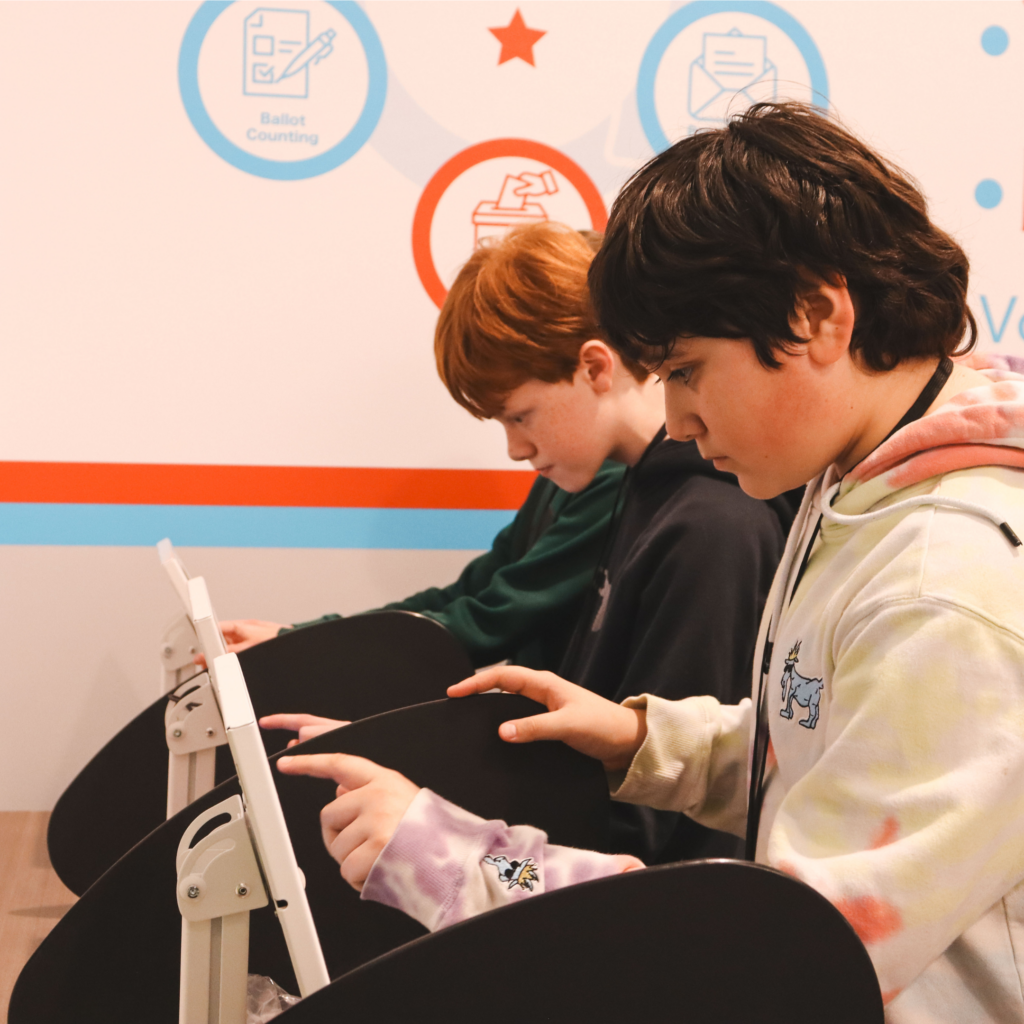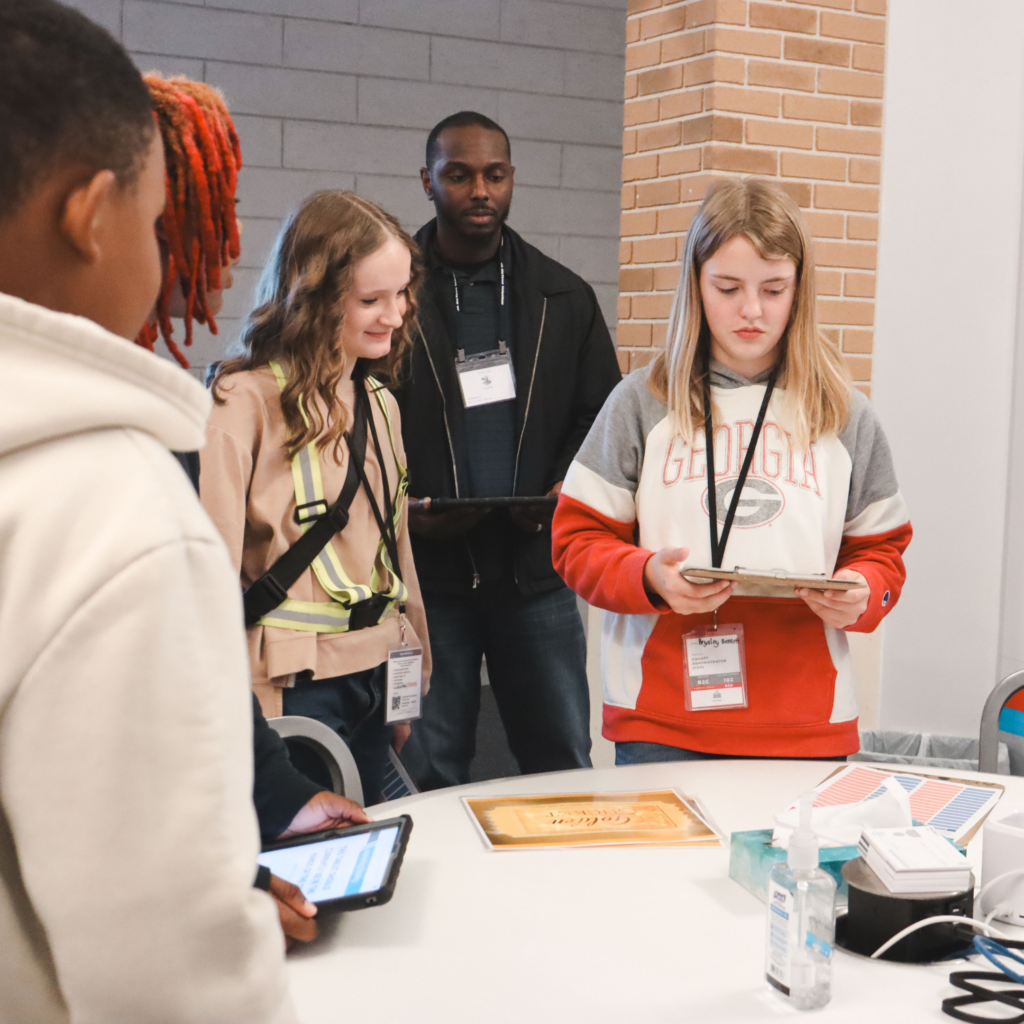Civics PlaybookJunior Achievement of Georgia
- Mission: To educate and equip students to become informed and active citizens.
- Geographic Focus: Georgia –with plans to expand across the nation
- Audience: K-12 students and teachers, college students and teachers, and school administrators
- Budget: $1.8 million
- Focus Areas & Core Competencies:
- Hands-on civics participation
- Youth-in-Government Expo
- Teacher resources


Entrepreneurship Inspires a Thriving Civil Society
Impact: Junior Achievement of Georgia
Through Junior Achievement (JA) of Georgia 55,000 sixth graders will experience JA BizTown’s civics and business program this school year.
A Conversation with John Hancock, president and CEO of Junior Achievement of Georgia
Q: What is the mission of JA’s BizTown? What problem(s) in civics education is your nonprofit working to solve?
Junior Achievement (JA) of Georgia is a business-integrated education partner with expertise in experiential learning models that successfully develops key mindsets and skills for students to lead meaningful and successful lives. One of the organization’s flagship programs is JA BizTown, a program that blends in-class, teacher-taught curriculum with a culminating simulation experience in an 8,000-square-foot model city.
This program gives sixth grade students the opportunity to interact in a simulated economy and take on the challenge of running a business. Students are assigned a job within one of the many businesses in JA BizTown, and they learn what it is like to work a job, earn and budget a paycheck and witness the circular flow of money. JA BizTown includes a civics component wherein the students also pay taxes, vote for elected officials for the day and consider various community improvement projects.
About five years ago, the Billi and Bernie Marcus Foundation based in Atlanta approached JA regarding its concern about the lack of adequate civics education in America. Rather than creating new civics-related organizations or programs, the Marcus Foundation sought to collaborate with existing organizations like JA to elevate civics lessons within existing programs. The basic idea was that a flourishing civil society depends on people understanding how civic engagement works, given that so many do not.
Since JA BizTown already focused on business, entrepreneurship, citizenship and government, JA of Georgia was a great fit for this initiative. In partnership with the Marcus Foundation, we decided to further emphasize concepts like the importance of voting, volunteering and civic engagement. We also made enhancements to help JA BizTown students make connections about what civics is in the broadest sense, including the interdependence of the different sectors of society. JA BizTown exists in six Georgia markets as well as multiple markets across the country. By now, most of these JA operations have adopted JA of Georgia’s “elevate civics” modifications in their respective JA BizTown programs.
Q: How do you describe the big goals JA’s BizTown is working to achieve? How do you measure impact?
An inherent disconnect exists between education and preparation for the workforce. While Georgia is home to a diverse economy and leading regional and national companies, it is currently experiencing a worker shortage, with 54 available workers for every 100 open jobs. The increase in job openings and the corresponding struggle to fill these positions represents the mismatch between the demand for talent and the number of workers qualified to meet that demand.
Additionally, there is a need within education to incorporate financial literacy into the curriculum. A recent study from Creative Research Solutions found that Georgia youth want access to programs that provide financial literacy and entrepreneurship courses, information on different jobs and career fields and workshops that teach them how to manage their money. Finally, we know that additional civics education is critical to young people’s future and civil society broadly.
JA programs, including JA BizTown, are measured both quantitatively and qualitatively. Regarding the quantitative, approximately 55,000 sixth graders will experience JA BizTown this school year. Regarding qualitative measures, JA uses a comprehensive evaluation methodology across all programs that show proven and measurable outcomes. Results show that JA BizTown students are more likely to vote when they become of age, better understand the importance of volunteering and better appreciate the importance of giving voice to things that matter to them.
Q: What are some of the biggest challenges JA BizTown has experienced in working to accomplish its mission? How did your organization overcome those challenges?
JA BizTown aligns well with the curriculum and strategic priorities of the school systems we work with. As such, the program usage is high with about half the state’s middle school students participating. The pedagogy of the program is a blend of in-class curriculum with a culminating simulation experience at a JA center. The coordination associated with this format comes with significant financial expense to provide the people, materials and venue for the program implementation. So, one ongoing challenge is finding the funding necessary to sustain and grow the program both in existing and future sites.
Q: What is JA BizTown’s biggest need? Where can philanthropists help your organization achieve its goals?
JA of Georgia has a long-term strategic north star to eventually have 90% of the sixth grade students in the state experience the JA BizTown program. This will require additional JA centers, wherein the program runs, to be strategically placed in more locations around the state. Corporate and family foundations will play a significant role in establishing these centers. Investments range from modest sponsorships to full building naming opportunities.

Contact Our Team
Contact the Roundtable’s Programs team to learn more about this investment opportunity.